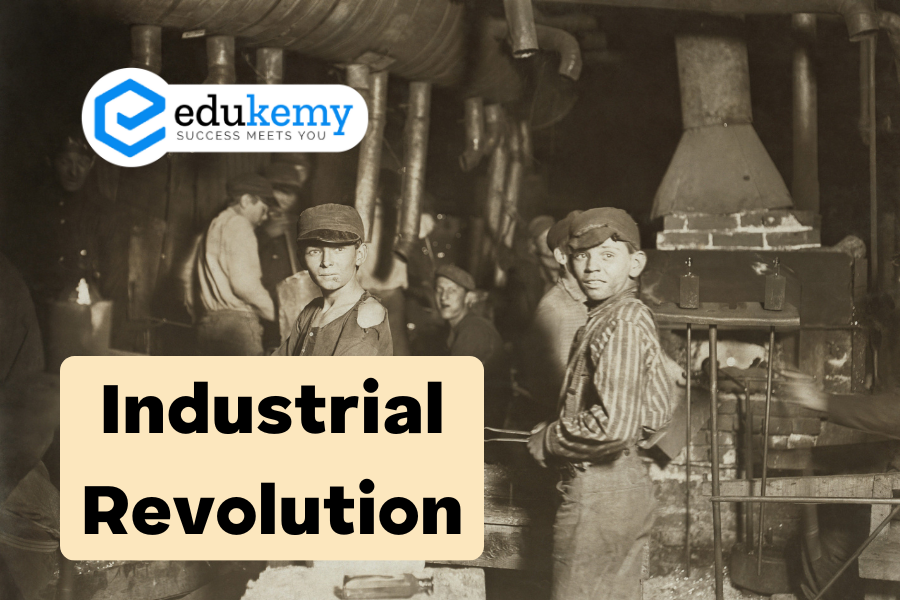
The Industrial Revolution, which began in mid-18th century England, was a watershed moment in human history. It represents a fundamental shift in economic, technological, and societal processes. Here are some key aspects of the Industrial Revolution:
- Definition: The Industrial Revolution refers to a profound and widespread transformation in the methods of production, driven by technological innovations. It revolutionized how goods were produced, moving from manual labour and craft-based techniques to mechanized and factory-based production.
- Technological Innovation: The heart of the Industrial Revolution was a series of technological breakthroughs. This included the development of new machinery (like the spinning jenny and steam engine) and processes (such as mechanized textile production). These innovations significantly increased the efficiency and scale of production.
- Economic Impact: The Industrial Revolution led to a surge in economic activity and output. Factories emerged as the new centres of production, replacing traditional cottage industries. This revolutionized economic processes and propelled nations into the modern industrial age.
- Technological Advancements:
- Mechanized Production: The introduction of machines mechanized various aspects of production, significantly boosting productivity.
- Power Sources: The development of steam engines and later, electricity, revolutionized the way factories were powered.
- Transport and Communication: The revolution also extended to transportation and communication, with innovations like railways and the telegraph transforming how goods and information were exchanged.
- Social Impact:
- Urbanization: The shift from agrarian economies to industrial ones led to mass migration from rural areas to cities, resulting in rapid urbanization.
- Labour Changes: Workers transitioned from independent craftsmen to wage labourers in factories. This altered the dynamics of labour and led to the emergence of the working class.
- Standard of Living: Over time, the Industrial Revolution led to improvements in living standards for many, though it also brought about challenges and disparities.
- Political and Social Consequences: The Industrial Revolution had profound effects on politics and society. It played a key role in shaping ideologies like liberalism, socialism, and capitalism. It also gave rise to labour movements and calls for workers’ rights.
- Global Impact: The Industrial Revolution eventually spread to other parts of the world, transforming economies and societies globally.
In summary, the Industrial Revolution was a multifaceted transformation that revolutionized the economic, technological, social, and political landscapes. Its effects continue to shape the modern world in numerous ways.
Contents
- 1 FAQs
- 1.1 Q: What was the Industrial Revolution?
- 1.2 Q: What were the key inventions of the Industrial Revolution?
- 1.3 Q: How did the Industrial Revolution impact society?
- 1.4 Q: What were the environmental consequences of the Industrial Revolution?
- 1.5 Q: What were the global effects of the Industrial Revolution?
- 2 In case you still have your doubts, contact us on 9811333901.
FAQs
Q: What was the Industrial Revolution?
A: The Industrial Revolution was a period of profound economic, technological, and social transformation that began in Britain in the late 18th century. It marked the transition from agrarian and handicraft-based economies to industrialized, machine-driven ones.
Q: What were the key inventions of the Industrial Revolution?
A: Several key inventions revolutionized the industry during this time, including the spinning jenny, steam engine, cotton gin, power loom, and mechanized agriculture equipment. These innovations significantly increased productivity and transformed manufacturing processes.
Q: How did the Industrial Revolution impact society?
A: The Industrial Revolution brought about significant social changes. It led to urbanization as people moved from rural areas to cities in search of employment in factories. It also resulted in the rise of the working class, the decline of traditional artisanal crafts, and changes in family structure and dynamics.
Q: What were the environmental consequences of the Industrial Revolution?
A: The Industrial Revolution had profound environmental impacts. Rapid industrialization led to air and water pollution, deforestation, and the depletion of natural resources. These environmental consequences continue to affect ecosystems and human health to this day.
Q: What were the global effects of the Industrial Revolution?
A: The Industrial Revolution spread beyond Britain to other parts of Europe, North America, and eventually the rest of the world. It transformed global trade patterns, accelerated imperialism and colonialism, and laid the groundwork for modern capitalism and globalization.
In case you still have your doubts, contact us on 9811333901.
For UPSC Prelims Resources, Click here
For Daily Updates and Study Material:
Join our Telegram Channel – Edukemy for IAS
- 1. Learn through Videos – here
- 2. Be Exam Ready by Practicing Daily MCQs – here
- 3. Daily Newsletter – Get all your Current Affairs Covered – here
- 4. Mains Answer Writing Practice – here

